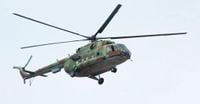On the evening of April 25, 2025, a Russian military helicopter from the Baltic Fleet violated Polish airspace over the territorial waters of Poland in the Baltic Sea. This alarming incident was reported by the Operational Command of the Polish Armed Forces, highlighting ongoing tensions in the region.
The helicopter's flight was tracked by both military radar systems and civilian air traffic control systems within Poland, underscoring the seriousness of the breach. Polish air defense forces were placed on high alert to ensure the security of the country's airspace, ready to respond to any potential escalation.
According to the Polish military, the nature of this incident indicates that Russia may be testing the readiness of Poland's air defense systems. This assertion aligns with a broader pattern of provocative military actions by Russia in recent years, raising concerns among NATO allies about security in Eastern Europe.
Notably, this is not the first such incident. A similar violation occurred earlier this year in February, when a Russian fighter jet breached Polish airspace. These repeated incursions have prompted Polish officials to call for increased vigilance and preparedness in the face of potential threats from the east.
In a related context, on April 24, just a day before the helicopter incident, Poland had already scrambled F-16 fighters to protect its airspace due to missile strikes from Russia targeting Ukraine. The Polish military's proactive measures reflect a heightened state of alert as regional tensions escalate.
Adding to the sense of urgency, recent remarks from German historian and Potsdam University professor Zenke Neitzel suggested that this summer could be the last peaceful summer in Europe. He warned of a possible Russian attack on Lithuania as early as this autumn, citing significant shifts in global security dynamics driven by Russian President Vladimir Putin's aggressive policies.
Neitzel's comments resonate with growing fears among European leaders, especially in Germany, where political figures have criticized U.S. President Donald Trump's peace plan as potentially emboldening Russia to launch further military actions. "This will be an encouragement for despots around the world to use war as a distraction from internal problems," warned Jürgen Hardt, a representative from Germany's CDU/CSU foreign policy team.
On April 20, two Russian aircraft attempted to breach NATO airspace, prompting the Royal Air Force of the United Kingdom to scramble jets twice within 48 hours. This series of incidents underscores the fragile security environment in Europe and the need for NATO allies to remain vigilant against Russian provocations.
The Polish government has reiterated its commitment to safeguarding national security and maintaining readiness against any threats. The recent airspace violations serve as a stark reminder of the ongoing geopolitical tensions in the region and the importance of collective defense among NATO member states.
In summary, the violation of Polish airspace by a Russian military helicopter on April 25, 2025, reflects a troubling trend of aggressive military posturing by Russia, which raises alarms for Poland and its NATO allies. As the situation continues to evolve, the need for strategic preparedness and cooperation among European nations remains critical.





